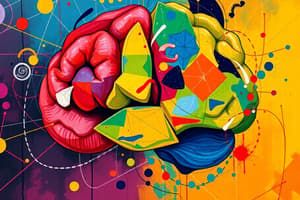Podcast
Questions and Answers
What type of thinking is based on perception and involves interpretation of sensation according to one's experience?
What type of thinking is based on perception and involves interpretation of sensation according to one's experience?
- Perceptual thinking (correct)
- Creative thinking
- Conceptual thinking
- Reflective thinking
Which type of thinking does not require perception of actual objects or events?
Which type of thinking does not require perception of actual objects or events?
- Creative thinking
- Reflective thinking
- Conceptual thinking (correct)
- Perceptual thinking
What type of thinking aims at problem solving by accounting for all relevant facts before finding a solution?
What type of thinking aims at problem solving by accounting for all relevant facts before finding a solution?
- Reflective thinking (correct)
- Creative thinking
- Perceptual thinking
- Conceptual thinking
Which type of thinking is aimed at creating something new and produces a new, novel, and useful solution?
Which type of thinking is aimed at creating something new and produces a new, novel, and useful solution?
What is the main difference between divergent thinking and convergent thinking?
What is the main difference between divergent thinking and convergent thinking?
During which stage of creative thinking does the 'aha' insight experience occur?
During which stage of creative thinking does the 'aha' insight experience occur?
What is a characteristic of creative thinkers based on the provided text?
What is a characteristic of creative thinkers based on the provided text?
During concept formation, what is the step that involves discrimination for the separation of similar and dissimilar qualities?
During concept formation, what is the step that involves discrimination for the separation of similar and dissimilar qualities?
'Object permanence' is a concept associated with which stage of cognitive development according to Piaget?
'Object permanence' is a concept associated with which stage of cognitive development according to Piaget?
Which type of thinking involves verbal symbols, internal, visual and auditory images, ideas, concepts and mathematical symbols?
Which type of thinking involves verbal symbols, internal, visual and auditory images, ideas, concepts and mathematical symbols?
What type of thinking takes place when an individual is exposed to an unfamiliar situation in which habitual responses are inadequate for adjustment?
What type of thinking takes place when an individual is exposed to an unfamiliar situation in which habitual responses are inadequate for adjustment?
During concept formation, which step involves the manipulation of information encoded in memory to establish connections, relationships, and organize behavior?
During concept formation, which step involves the manipulation of information encoded in memory to establish connections, relationships, and organize behavior?
'Object permanence' is a concept associated with which stage of cognitive development according to Piaget?
'Object permanence' is a concept associated with which stage of cognitive development according to Piaget?
Which type of thinking is based on perception and involves interpretation of sensation according to one's experience?
Which type of thinking is based on perception and involves interpretation of sensation according to one's experience?
What is a characteristic of creative thinkers based on the provided text?
What is a characteristic of creative thinkers based on the provided text?
Which type of thinking involves verbal symbols, internal visual and auditory images, ideas, concepts and mathematical symbols?
Which type of thinking involves verbal symbols, internal visual and auditory images, ideas, concepts and mathematical symbols?
What type of thinking aims at problem solving by accounting for all relevant facts before finding a solution?
What type of thinking aims at problem solving by accounting for all relevant facts before finding a solution?
'Object permanence' is a concept associated with which stage of cognitive development according to Piaget?
'Object permanence' is a concept associated with which stage of cognitive development according to Piaget?
Which type of thinking does not require perception of actual objects or events?
Which type of thinking does not require perception of actual objects or events?
Flashcards are hidden until you start studying
Study Notes
Types of Thinking
- Perceptual thinking is based on perception and involves interpretation of sensation according to one's experience.
- Abstract thinking does not require perception of actual objects or events.
- Critical thinking aims at problem solving by accounting for all relevant facts before finding a solution.
- Creative thinking is aimed at creating something new and produces a new, novel, and useful solution.
Creative Thinking
- Divergent thinking generates many ideas, whereas convergent thinking narrows down options to find a single solution.
- The 'aha' insight experience occurs during the incubation stage of creative thinking.
- Creative thinkers are characterized by ability to find connections between seemingly unrelated things.
Cognitive Development
- Object permanence is a concept associated with the sensorimotor stage of cognitive development according to Piaget.
Concept Formation
- Discrimination involves the separation of similar and dissimilar qualities.
- Elaboration involves the manipulation of information encoded in memory to establish connections, relationships, and organize behavior.
thinking and Problem Solving
- Adaptive thinking takes place when an individual is exposed to an unfamiliar situation in which habitual responses are inadequate for adjustment.
- Symbolic thinking involves verbal symbols, internal visual and auditory images, ideas, concepts, and mathematical symbols.
Studying That Suits You
Use AI to generate personalized quizzes and flashcards to suit your learning preferences.




